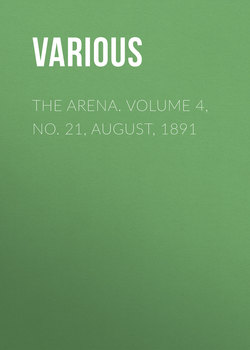The Arena. Volume 4, No. 21, August, 1891

Реклама. ООО «ЛитРес», ИНН: 7719571260.
Оглавление
Various. The Arena. Volume 4, No. 21, August, 1891
THE UNITY OF GERMANY
“The Idea Whence Sprang the Fact.”1
II
“SHOULD THE NATION OWN THE RAILWAYS?”9
PART II.—The Advantages of National Ownership
WHERE MUST LASTING PROGRESS BEGIN?
MY HOME LIFE
THE TYRANNY OF NATIONALISM.12
INDIVIDUALITY IN EDUCATION
THE WORKING-WOMEN OF TO-DAY
THE INDEPENDENT PARTY AND MONEY AT COST
PSYCHIC EXPERIENCES
Introductory Remarks by B. F. Underwood
A DECADE OF RETROGRESSION
OLD HICKORY’S BALL
EDITORIAL NOTES
THE ERA OF WOMAN
Отрывок из книги
Since the Great French Revolution of 1789 and its immediate consequence in the military despotism of Bonaparte, nothing has occurred that has so convulsed the Old World and so altered the conditions of men and things, as the establishment of the United German Empire in 1870. The men of our time are obliged to know how this event came about, or remain in ignorance of all that has happened during the twenty years following it—that is, to ignore their own political status.
Now two records of this enormous change in all our destinies exist; as yet there are but two, and modern men are bound in duty to take cognizance of them. One is the famous “History,” written in Germany by Heinrich von Sybel; the other the work of Prof. Lévy Brühl, published in France. Both must be read.2
.....
From the vast system formed by the monster-questions—United Germany, the Latin races, the East, the future of catholicism and the papacy, the strife of liberty against despotism—from all these parent problems you can detach none of the smaller incidents of the age; you are obliged to take count of the little Danish Campaign, which taught Prussia those deficiencies, impelling her directly to the attainment of her future military omnipotence, and which, under the abortive attempts of the Saxon minister, M. de Beust,* gave a timid reminder to Germany of what her unity had been and might once again be. Each incident, however local or however remote, formed a feature of the whole; between 1854 and 1870, you cannot ignore the would-be secession of the Southern Confederates, which ended in making “all America” the counterpoise to our older world—neither dare you neglect the Indian meeting whence England issued, clad in moral as in political glory, and gave the noblest sign of the Christian significancy of the Victorian Era; all holds together, men and facts succeed each other in quick alternation; the light that fades on one hand shines with dazzling glare on the other. Cavour dies. Greatest of all, and genuine creator, with his disappearance the equilibrium is endangered. Right ceases to reign, force asserts itself, and Bismarck, ironhanded, invincible, holds sway over a scared, unresisting, one may say a soulless world.
This is the turning-point. The one man theory apparently endures; but physically and morally, the vision of disintegration rises, threatening all; and whence the “New Order” is to come, above all morally, none divine.
.....